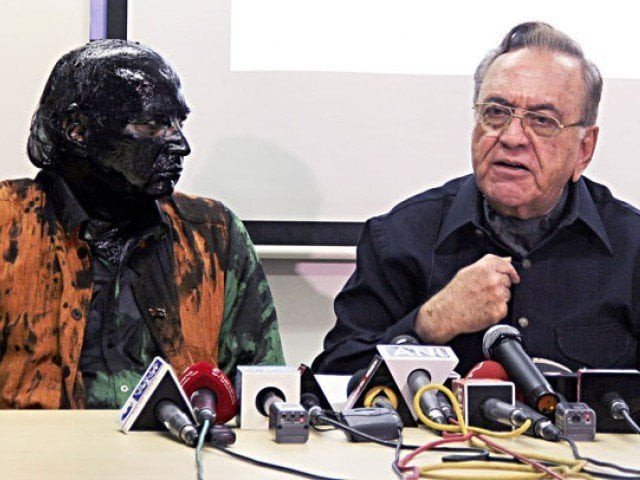The thin veneer
Most minorities in India, especially Muslims, feel insecure and unsafe today because of Shiv Sena goons

Indian activist Sudheendra Kulkarni (L), whose face was blackened by ink in an alleged attack, looks on as former Pakistani foreign minister Khurshid Mahmud Kasuri speaks to media in Mumbai on October 12, 2015. PHOTO: AFP
The two incidents that have most appalled the thinking Indian include the lynching of a Muslim man last month and the murder of a rationalist thinker in August. In the first, a mob in the village of Dadri believed their victim had eaten beef and beat him to death outside his home. In the second incident, Malleshappa Kalburgi, an award-winning scholar whose frequent criticism of what he saw as superstition and false beliefs had angered Hindu extremists, was gunned down in the southern state of Karnataka. This has now been followed by the lynching of another Muslim man in Himachal Pradesh over rumours that he was smuggling cattle.
One would tend to agree with Samir Saran, of India’s Observer Research Foundation, who said that “louder and more rabid right-wing groups” in India felt emboldened by the mandate won by Modi, leader of the BJP, in last year’s poll and believed they now had more freedom to go on the rampage. He is perhaps, right again when he says that the greater scrutiny and reporting of such incidents following Modi’s victory obscured the fact that such incidents had also happened under previous governments led by the centre-left Congress party.
There is a long history of clashes over culture and effective censorship by parties and leaders from across the political spectrum in India. Politicians have repeatedly sought to ban or restrict the sale or production of specific books. Veteran actor Naseeruddin Shah faced severe backlash after speaking in favour of peaceful relations between Pakistan and India and urging people to focus on their similarities rather than their differences. The Shiv Sena also forced the cancellation of Pakistani ghazal singer Ghulam Ali’s concert in Mumbai. What is heartening, however, is the reaction of some in the Indian civil society to these incidents that gives one hope that this could be a passing political phenomenon that would disappear in due course. Leading writers are returning their national awards in protest against such acts. More than 40 novelists, essayists, playwrights and poets have now returned awards from the country’s most prestigious literary institution, the Sahitya Akademi. “It’s become a question of an individual’s right to speak, to think, to write, to eat, to dress, to debate,” said Maya Krishna Rao, a playwright and actor, who returned her award to the academy.
Most minorities in India, especially Muslims, feel insecure and unsafe today because of Shiv Sena goons. It also now seems that even ordinary Pakistanis are not welcome in India. A Pakistani family had to recently spend time on the footpaths of Mumbai because no hotel in the city was prepared to accommodate them, fearing perhaps attacks from Shiv Sena activists. While the multitude of the Shiv Sena sevaks seem to be doing their best to malign India’s image, Prime Minister Modi and his cabinet colleagues seem to be reassuring themselves by dismissing their extremist acts as merely “unfortunate”. There is a need for India to realise that ignoring or trivialising such incidents will not serve the cause of pluralism and will only stoke more violence. Similar muted reactions to incidents of intolerance by successive Pakistani governments have, over the years, led to the strengthening of extremism in Pakistani society. India needs to learn that going down that road will only cause harm to Indian diversity and notions of tolerance.
Published in The Express Tribune, October 18th, 2015.
Like Opinion & Editorial on Facebook, follow @ETOpEd on Twitter to receive all updates on all our daily pieces.















COMMENTS
Comments are moderated and generally will be posted if they are on-topic and not abusive.
For more information, please see our Comments FAQ